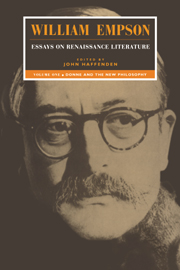Book contents
- Frontmatter
- Contents
- Preface
- Sources and acknowledgements
- Introduction by John Haffenden
- 1 Donne and the rhetorical tradition
- 2 Donne the space man
- 3 Donne in the new edition
- 4 Rescuing Donne
- 5 Donne's foresight
- 6 Copernicanism and the censor
- 7 Thomas Digges his infinite universe
- 8 Godwin's voyage to the moon
- Appendix on Galileo
- Notes
- Index
Introduction by John Haffenden
Published online by Cambridge University Press: 01 February 2010
- Frontmatter
- Contents
- Preface
- Sources and acknowledgements
- Introduction by John Haffenden
- 1 Donne and the rhetorical tradition
- 2 Donne the space man
- 3 Donne in the new edition
- 4 Rescuing Donne
- 5 Donne's foresight
- 6 Copernicanism and the censor
- 7 Thomas Digges his infinite universe
- 8 Godwin's voyage to the moon
- Appendix on Galileo
- Notes
- Index
Summary
I think one major and much needed reform is now in progress, a decisive break away, if it can be pressed hard enough, from the iron rule of the T. S. Eliot men. It is the recognition that people held a great variety of religious or philosophical opinions in the sixteenth and seventeenth centuries, though they were cautious about printing it; instead of all having to agree with T. S. Eliot, because they knew no other.
from the introduction to Empson's unpublished Clark Lectures, 1974‘No man really likes being promoted to the class of Licensed Buffoons’, wrote William Empson in 1966, at a time when he was given cause to reflect on his own critical reputation, ‘but it has been an important post in England since the time of Jaques, I suppose, let alone Bernard Shaw.’ Empson's status as a Licensed Buffoon has recently been rehearsed, or rather ironically celebrated, by John Carey, Merton Professor of English Literature at the University of Oxford, in a review of Frank Kermode's An Appetite for Poetry. Empson, Carey writes,
was pugnacious, irascible and dogmatic – a rottweiler to Kermode's pekinese. Far from sharing Kermode's courteous hospitality to divergent viewpoints, he thought he was right, and that anyone who disagreed with him was detestable and base. In fact, he was persistently wrong, indeed crack-brained, on some issues, as Kermode shows. He believed all his life that John Donne was interested in space travel, and in the theological problems of extra-terrestrial life-forms, and he once assured Kermode that Donne's ‘The Good Morrow’ took place on the planet Venus. But even in these loopy seizures Empson compelled attention because he passionately believed in himself.
- Type
- Chapter
- Information
- William Empson: Essays on Renaissance Literature , pp. 1 - 62Publisher: Cambridge University PressPrint publication year: 1993

